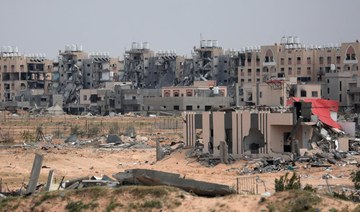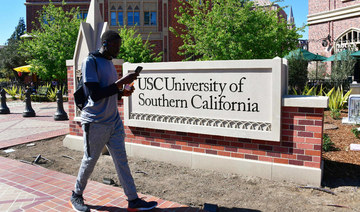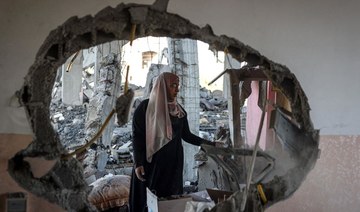BEIRUT: Lebanese journalists are facing threats and wide-ranging harassment in their work — including verbal insults and physical attacks, even death threats — while reporting on nearly 50 days of anti-government protests, despite Lebanon’s reputation as a haven for free speech in a troubled region.
Nationwide demonstrations erupted on Oct. 17 over a plunging economy. They quickly grew into calls for sweeping aside Lebanon’s entire ruling elite. Local media outlets — some of which represent the sectarian interests protesters are looking to overthrow — are now largely seen as pro- or anti-protests, with some journalists feeling pressured to leave their workplaces over disagreements about media coverage.
The deteriorating situation for journalists in Lebanon comes despite its decades-old reputation for being an island of free press in the Arab world. Amid Lebanon’s divided politics, media staff have usually had wide range to freely express their opinions, unlike in other countries in the region where the state stifles the media.
The acts of harassment began early in the protests. MTV television reporter Nawal Berry was attacked in central Beirut in the first days of the demonstrations by supporters of the militant group Hezbollah and its allies. They smashed the camera, robbed the microphone she was holding, spat on her and kicked her in the leg.
“How is it possible that a journalist today goes to report and gets subjected to beating and humiliation? Where are we? Lebanon is the country of freedoms and democracy,” Berry said.
Outlets like MTV are widely seen as backing protesters’ demands that Lebanon’s sectarian political system be completely overturned to end decades of corruption and mismanagement.
Rival TV stations and newspapers portray the unrest — which led to the Cabinet’s resignation over a month ago — as playing into the hands of alleged plots to undermine Hezbollah and its allies. Many of those outlets are run by Hezbollah, President Michel Aoun’s Free Patriotic Movement and the Amal Movement of Parliament Speaker Nabih Berri. These media regularly blast protesters for closing roads and using other civil disobedience tactics, describing them as “bandits.”
For Berry, the media environment worsened as the unrest continued. On the night of Nov. 24, while she was covering clashes between protesters and Hezbollah and Amal supporters on a central road in Beirut, supporters of the Shiite groups chased her into a building. She hid there until police came and escorted her out.
“I was doing my job and will continue to do so. I have passed through worse periods and was able to overcome them,” said Berry, who added she is taking a short break from working because of what she passed through recently.
Hezbollah supporters also targeted Dima Sadek, who resigned last month as an anchorwoman at LBC TV. She blamed Hezbollah supporters for robbing her smartphone while she was filming protests, and said the harassment was followed by insulting and threatening phone calls to her mother, who suffered a stroke as a result of the stress.
“I have taken a decision (to be part of the protests) and I am following it. I have been waiting for this moment all my life and I have always been against the political, sectarian and corrupt system in Lebanon,” said Sadek, a harsh critic of Hezbollah, adding that she has been subjected to cyberbullying for the past four years.
“I know very well that this will have repercussions on my personal and professional life. I will go to the end no matter what the price is,” Sadek said shortly after taking part in a demonstration in central Beirut.
Protesters have also targeted journalists reporting with what are seen as pro-government outlets. OTV station workers briefly removed their logos from equipment while covering on the demonstrations to avoid verbal and physical abuse. The station is run by supporters of Aoun’s FPM.
“The protest movement has turned our lives upside down,” said OTV journalist Rima Hamdan, who during one of her reports slapped a man on his hand after he pointed his middle finger at her. She said the station’s logo “is our identity even though sometimes we had to remove it for our own safety.”
Television reporters with Hezbollah’s Al-Manar and Amal’s NBN channels were also attacked in a town near Beirut, when they were covering the closure of the highway linking the capital city with southern Lebanon by protesters. In a video, an NBN correspondent is seen being attacked, while troops and policemen stand nearby without intervening.
“This happens a lot in Lebanon because some media organizations are politicized. No one sees media organizations as they are but sees them as representing the political group that owns them,” said Ayman Mhanna, director of the Beirut-based media watchdog group SKeyes.
“The biggest problem regarding these violations is that there is no punishment,” Mhanna said. Authorities usually fail to act even when they identify those behind attacks on journalists, he added.
Coverage of the protests also led to several journalists resigning from one of Lebanon’s most prominent newspapers, Al-Akhbar, which is seen as close to Hezbollah, and the pan-Arab TV station Al-Mayadeen, which aligns closely with the policies of Iran, Syria and Venezuela.
Joy Slim, who quit as culture writer at Al-Akhbar after more than five years, said she did so after being “disappointed” with the daily’s coverage of the demonstrations. She released a video widely circulated on social media that ridiculed those who accuse the protesters of being American agents.
Sami Kleib, a prominent Lebanese journalist with a wide following around the Middle East, resigned from Al-Mayadeen last month. He said the reason behind his move was that he was “closer to the people than the authorities.”
“The Lebanese media is similar to politics in Lebanon where there is division between two axes: One that supports the idea of conspiracy theory, and another that fully backs the protest movement with its advantages and disadvantages,” Kleib said.
Lebanon’s journalists suffer abuse, threats covering unrest
Lebanon’s journalists suffer abuse, threats covering unrest
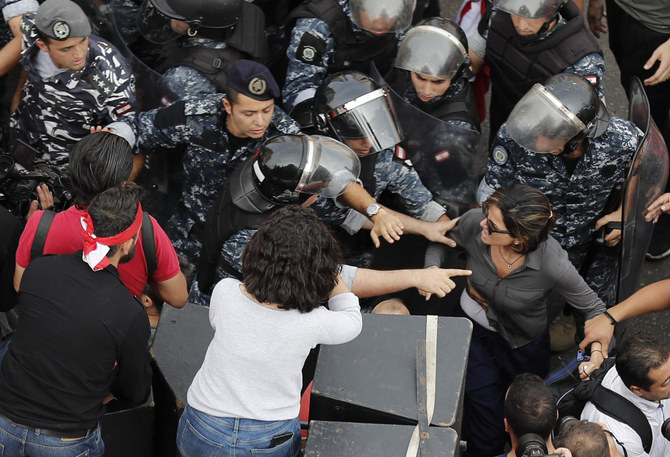
- The deteriorating situation for journalists in Lebanon comes despite its decades-old reputation for being an island of free press in the Arab world
TikTok CEO to fight US ban law
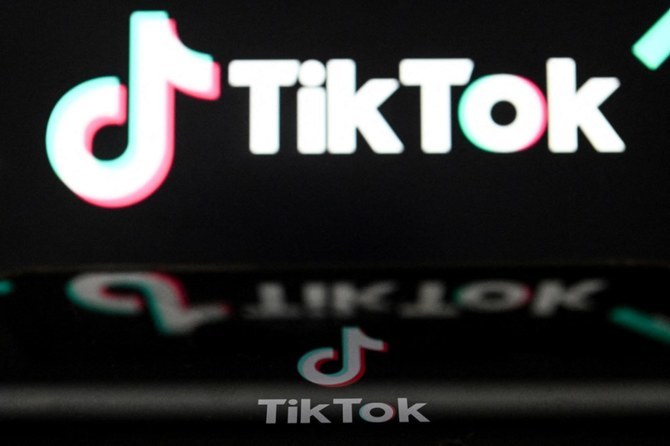
WASHINGTON: TikTok’s chief executive said on Wednesday that the company expects to win a legal challenge to block legislation signed into law by US President Joe Biden that he said would ban the popular short video app used by 170 million Americans.
“Rest assured — we aren’t going anywhere,” CEO Shou Zi Chew said in a video posted moments after Biden signed the bill that gives China-based ByteDance 270 days to divest TikTok’s US assets or face a ban. “The facts and the Constitution are on our side and we expect to prevail again.”
Biden’s signing sets a Jan. 19 deadline for a sale — one day before his term is set to expire — but he could extend the deadline by three months if he determines ByteDance is making progress. Biden is seeking a second term against former President Donald Trump.
In 2020, Trump was blocked by the courts in his bid to ban TikTok and Chinese-owned WeChat, a unit of Tencent, in the United States.
Chew added: “Make no mistake — this is a ban on TikTok.” He emphasized that TikTok would continue to operate as the company challenges the restrictions.
Driven by widespread worries among US lawmakers that China could access Americans’ data or surveil them with the app, the bill was overwhelmingly passed late on Tuesday by the US Senate. The US House of Representatives approved it on Saturday.
The four-year battle over TikTok is a significant front in a war over the internet and technology between Washington and Beijing. Last week, Apple said China had ordered it to remove Meta Platforms’ WhatsApp and Threads from its App Store in China over Chinese national security concerns.
TikTok is set to challenge the bill on First Amendment grounds and TikTok users are also expected to again take legal action. A US judge in Montana in November blocked a state ban on TikTok, citing free-speech grounds.
The American Civil Liberties Union said banning or requiring divestiture of TikTok would “set an alarming global precedent for excessive government control over social media platforms.”
However, the new legislation is likely to give the Biden administration a stronger legal footing to ban TikTok if ByteDance fails to divest the app, experts say.
If ByteDance failed to divest TikTok, app stores operated by Apple, Alphabet’s Google and others could not legally offer TikTok or provide web hosting services to ByteDance-controlled applications or TikTok’s website.
The bill would also give the White House new tools to ban or force the sale of other foreign-owned apps it deems to be security threats.
Democratic Senator Ron Wyden said he was concerned the bill “provides broad authority that could be abused by a future administration to violate Americans’ First Amendment rights.”
Republican presidential candidate Donald Trump said on Monday that President Joe Biden was “pushing” for a ban on TikTok and would be the one responsible if a ban were imposed, urging voters to take notice.
Biden’s re-election campaign plans to continue using TikTok, a campaign official said on Wednesday. Trump’s campaign has not joined TikTok.
Biden signed legislation in late 2022 that barred US government employees from using TikTok on government phones.
Advertising network MCN launches influencer practice in Mideast

DUBAI: Regional advertising group Middle East Communications Network has launched a dedicated influencer practice in the Middle East, North Africa and Turkiye to help clients across the group’s agencies, including FP7McCann, MullenLowe, UM, and Weber Shandwick.
Rami Gholmieh has been appointed to lead the practice as the regional director of influencer marketing, while Razan Zahra will serve as director of influencer relations.
“At the heart of our influence practice lies a commitment to two fundamental principles: effectiveness and efficiency,” Gholmieh told Arab News.
“The challenge lies in creating balance between leveraging channels to encourage content sharing and investing into paid promotions. Ultimately it requires a nuanced approach, tailored to the specific objectives and audience dynamics of respective brands.”
The practice takes a “de-siloed” approach to help agency brands across the group deliver influencer marketing campaigns, according to MCN.

The influencer marketing industry is rapidly growing, with 76.9 percent of marketers saying influencer marketing is a top priority, and 46.2 percent increasing budgets last year, according to a 2023 survey.
The growth and evolution of the industry is partly the reason why MCN chose to launch a dedicated practice now despite influencer marketing having been around for years.
With “the evolving dynamics of consumer engagement and brand interactions combined with new platforms and changing consumption patterns, a dedicated and fully integrated practice within the broader ecosystem is required to create tailor-made solutions for our clients,” the company said.
As the digital and social media landscape becomes more complex, MCN’s influencer practice aims to help brands by “understanding the social voice, (acquiring) knowledge of real-time cultural insights, (and) possessing platform expertise, the ability to co-create, and journey awareness,” concluded Gholmieh.
Eurovision Song Contest host Sweden braces for anti-Israel protests

- Event organizer European Broadcasting Union has resisted calls for Israel to be excluded due to its war in Gaza
- Contest will take place in Malmo from 7-11 May and is expected to draw 100,000 visitors
MALMO: Sweden said it plans to host a dazzling Eurovision Song Contest, watched by 200 million people worldwide, but visitors face heightened security amid planned protests over Israel’s participation and a new geo-political backdrop since Sweden joined NATO.
The contest, the world’s biggest of its kind, takes place in Malmo from 7-11 May and is expected to draw 100,000 visitors to Sweden’s third-largest city which has a large Muslim population. Organizers plan a special tribute to Swedish pop group ABBA, who won Eurovision 50 years ago this year. The European Broadcasting Union (EBU), which organizes the contest, has resisted calls for Israel to be excluded due to its war in Gaza. Controversy over the conflict has already hit various cultural events across Europe. Much focus is expected to be on Israeli contestant Eden Golan and her song Hurricane, as multiple large pro-Palestinian protests are planned outside the venue in Malmo. Israel was permitted to compete after it agreed to modify the lyrics of its original song “October Rain” which the EBU said made reference to the Oct. 7 Hamas onslaught in Israel.
EBU brands Eurovision a non-political event and insists that the contest is between public service broadcasters, not governments.
Still, it banned Russian in 2022 from Eurovision after several European public broadcasters called for the country to be expelled following its invasion of Ukraine.
Sweden is hosting the annual competition for the seventh time, after Swedish singer Loreen won last year’s competition in Liverpool with her song “Tattoo.”
Ebba Adielsson, executive Eurovision producer from Swedish broadcaster SVT, promised “some smashing shows.” She ruled out an ABBA reunion but said the event would celebrate the group’s 1974 win with their song “Waterloo,” a victory that launched the band onto the international stage.
Swiss contestant Nemo is the favorite to win this year, according to bookmakers, followed by Croatia’s Baby Lasagna, Joost Klein of the Netherlands, and Italy’s Angelina Mango.
’HIGH THREAT-LEVEL’
Visitors from 89 countries expected in Malmo will have to pass through airport-like security checks when entering venues around the city.
“There’s a high threat level combined with a lot of people,” said Per-Erik Ebbestahl, Malmo’s security director.
Organizers face the risk of protests escalating into violence, heightened terror threats in the country, and increased tensions with Russia after Sweden’s NATO membership.
In central Malmo there are official posters for Eurovision but also protest banners replicating the same colorful design, with the word Eurovision replaced by ‘genocide’ and the words: “Israel out of Eurovision or Eurovision out of Malmo.”
Orwa Kadoura, a Palestinian living in Malmo and one of the organizers of the protests, said the Israeli delegation was “here to represent Israel and their government, which is committing acts of genocide right now.”
Israel rejects any accusation of genocide in Gaza during its war against Hamas.
Police say security will be tighter compared with when Sweden last hosted the event in 2016.
“The situation around the world is complex, and also the security for Sweden is different,” said Petra Stenkula, Malmo police chief. “We are ready for anything that can happen.”
Sweden joined NATO in March, two years after Russia’s invasion of Ukraine forced it to rethink its national security policy. Russia has threatened to take unspecified “political and military-technical counter-measures” in response.
Gang crime in Sweden’s biggest cities, including Malmo, has also been a problem for years, fueled by the drug trade.
Eurovision begins on May 7 with the first semifinal, followed by a second semifinal two days later and the final on Sat. May 11.
Sky News report reveals Israel’s involvement in mass grave in Gaza
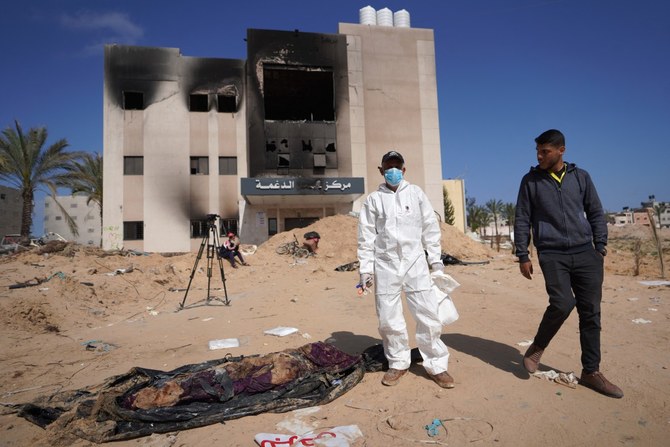
- Evidence suggests IDF bulldozed graves after taking control
LONDON: An investigation by Sky News suggests Israel is likely responsible for the mass grave discovered at a hospital in Gaza’s southern city of Khan Younis over the weekend.
Local authorities reported uncovering 283 bodies in the mass grave within the courtyard of Nasser Hospital after the Israel Defense Forces withdrew from the area on April 7.
Israel’s military dismissed claims of burying bodies there as “baseless” but confirmed that it had “examined” some bodies during a two-week operation at the hospital.
Analysis of satellite imagery and social media indicates that Palestinians buried their dead in mass graves during Israel’s siege of Nasser Hospital and that the IDF bulldozed these graves after taking control.
Prior to the Israeli army’s takeover of the hospital compound in its full-scale operation in February, staff had been forced to bury hundreds of bodies in makeshift graves near the hospital’s main building due to the impossibility of reaching nearby cemeteries.
The IDF began exhuming and examining bodies buried in the compound based on intelligence sources indicating the presence of bodies belonging to Israeli hostages.
The army said the examination “was carried out respectfully while maintaining the dignity of the deceased.
“Bodies examined, which did not belong to Israeli hostages, were returned to their place,” the IDF added.
However, Sky News’ Data and Forensic team discovered evidence indicating extensive damage to the sites caused by the army’s examination.
Footage uploaded a few days after the IDF left Nasser Hospital showed significant destruction at the southeastern corner of the complex, where some of the mass graves had been dug.
Another video revealed that bulldozer operations in the area caused an arm to be visible, partially buried in a mound of earth.
Satellite images confirmed that the damage occurred while Israeli forces were occupying the complex between Feb. 15 and 22.
The UN’s human rights chief expressed horror at the discovery and announced an investigation into claims that some of the bodies had their hands bound and were stripped of clothing.
Earlier last week, other mass graves were found at Al-Shifa, the largest medical facility in the coastal enclave.
The discovery led the Hamas-run government to accuse Israel of digging the graves “to hide its crimes.”
Since the conflict began, with retaliatory acts toward Hamas fighters killing and kidnapping 1,200 Israelis, Tel Aviv has launched a bloody, full-scale operation into the Gaza Strip that has resulted in the deaths of over 34,000 people, mostly women and children.
US police arrest Jadaliyya co-editor Sinan Antoon during pro-Gaza demonstration at New York University

- Antoon was arrested along with other NYU faculty members while attempting to protect demonstrating students from the police
- NYU students were calling for a ceasefire in Palestine's Gaza Strip
LONDON: US police officers on Monday arrested Sinan Antoon, the co-editor of Jadaliyya magazine, during a pro-Gaza demonstration at New York University in Manhattan.
The Arab Studies Institute publication announced in a post on X that Antoon, an associate professor at NYU, was arrested with other faculty members while trying to protect protesting students, who were reportedly calling for a ceasefire in the Gaza Strip.
BREAKING: NYPD arrested Jadaliyya Co-Editor and NYU Associate Professor Sinan Antoon along with other faculty and students as he/they was/were trying to protect NYU students from the Police. We will not ever be silenced.
— Jadaliyya (@jadaliyya) April 23, 2024
Antoon is an Iraqi-American poet, novelist, literary translator and academic. He was born and raised in Baghdad before moving to the US after the 1991 Gulf War.
The Israeli onslaught on the besieged enclave has since Oct. 7 killed at least 34,000 Palestinians, displaced some 1.9 million, and injured more than 75,800 people, according to Gaza’s health authority.
Confirming Jadaliyya’s announcement, human rights attorney Noura Erakat wrote on X: “NYPD is arresting faculty on their campuses for protecting their students.
“The academy is imbricated with the state and the military industry intent on war in blatant abrogation of its mission and any semblance of independence. What a gross betrayal.”
NYPD is arresting faculty on their campuses for protecting their students.
— Noura Erakat (@4noura) April 23, 2024
The academy is imbricated w the state & the military industry intent on war in blatant abrogation of its mission & any semblance of independence. What a gross betrayal. #Gaza #Genocide #Nakba https://t.co/f0tnYhHnNt
On Monday, officers from the New York Police Department moved in on NYU demonstrators after a deadline expired for people to clear an area of the campus, the Financial Times reported.
This came hours after New York’s Columbia University, where more than 100 people were arrested last week, announced it would switch to online classes in an attempt to defuse pro-Palestine protests.
The arrests at the NYU campus are part of a string of US police clampdowns on university students across the country protesting against the war on Gaza.
Local authorities claimed the clampdowns came amid scrutiny over “antisemitism” on US university campuses.
US police also arrested at least 47 pro-Gaza demonstrators at Yale University in New Haven, Connecticut.
The Columbia University clampdown, the first of its kind in three decades, triggered protests on other US campuses, including at Brown University, Berkeley, Princeton, Northwestern, Massachusetts Institute of Technology, and Emerson College in Boston.
In addition to calling for a ceasefire in Gaza, the protesting students also reportedly called for divestment of the university’s funds from companies linked to Israel.












